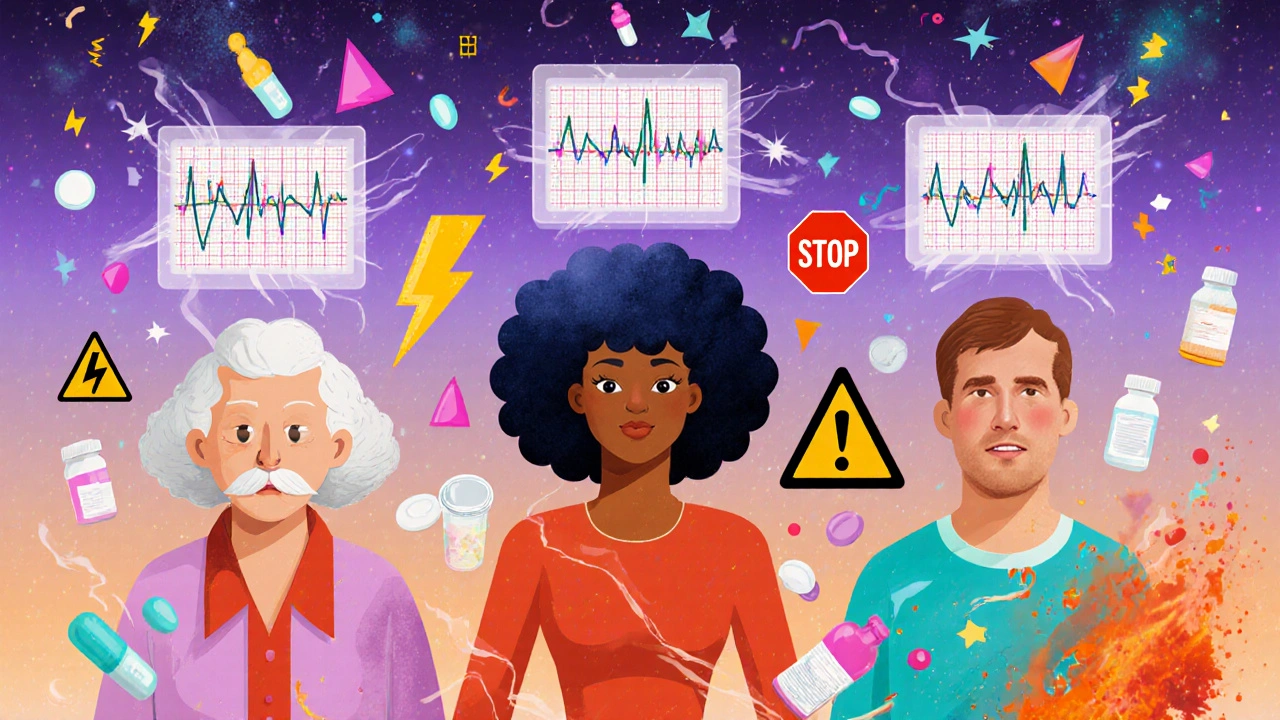20 Nov 2025
- 15 Comments
Macrolide QT Prolongation Risk Calculator
Risk Assessment
This tool estimates your risk of QT prolongation when taking macrolide antibiotics based on factors described in the article. Results are for informational purposes only and do not replace medical advice.
When you take an antibiotic like azithromycin or clarithromycin for a sinus infection or bronchitis, you’re probably not thinking about your heart. But for some people, these common drugs can trigger a dangerous change in heart rhythm - one that can lead to sudden cardiac arrest. The culprit? QT prolongation.
What Is QT Prolongation and Why Does It Matter?
Your heart beats because of electrical signals that travel through muscle tissue. The QT interval on an ECG measures how long it takes for the heart’s lower chambers (ventricles) to recharge between beats. If this interval gets too long, the heart can develop a chaotic rhythm called Torsades de Pointes - a type of ventricular tachycardia that can turn deadly within seconds. Macrolide antibiotics, including azithromycin, clarithromycin, and erythromycin, are known to interfere with this process. They block a specific potassium channel in heart cells (called hERG/Ikr), which slows down the heart’s ability to reset after each beat. This delay shows up as a longer QT interval on an ECG. In most people, it’s harmless. But in others, especially those with other risk factors, it can spark a life-threatening arrhythmia.Not All Macrolides Are Created Equal
Many assume azithromycin is the safest option because it’s widely prescribed. And yes, it’s less risky than clarithromycin - but it’s not risk-free. - Clarithromycin has the strongest effect on QT prolongation. It doesn’t just block potassium channels; it also inhibits the liver enzyme CYP3A4, which can cause other QT-prolonging drugs to build up in your system. That’s why it carries a FDA black box warning. - Erythromycin is weaker at blocking potassium channels but causes severe stomach upset in many people. Vomiting and diarrhea can drop potassium levels, which further increases arrhythmia risk. - Azithromycin is the mildest of the three in terms of direct channel blockade and doesn’t interfere much with liver enzymes. But here’s the catch: even azithromycin has been linked to increased cardiovascular deaths in high-risk patients. A 2012 study tracking over 1.3 million prescriptions found a 2.85 excess death rate per 1,000 courses during the first five days of treatment. The FDA recorded only about 10 cases of QT-related events per 10 million azithromycin prescriptions - but those numbers don’t tell the full story. Risk isn’t about averages. It’s about who you are.Who’s at Real Risk?
Most healthy adults can take macrolides without issue. But if you have any of these six factors, your risk jumps dramatically:- Female sex - 68% of reported TdP cases occur in women.
- Age over 65 - Risk more than doubles.
- Baseline QTc over 450 ms - Four times more likely to develop dangerous arrhythmias.
- Other QT-prolonging drugs - Taking even one additional drug like antidepressants, antifungals, or antiarrhythmics multiplies the risk. Each extra drug adds about 80% more danger.
- Low potassium or magnesium - Hypokalemia increases risk over threefold.
- Heart failure or structural heart disease - Risk increases more than fivefold.

When Should You Get an ECG?
The American College of Cardiology recommends a baseline ECG before starting a macrolide if you have two or more of the risk factors listed above. If your QTc is already over 470 ms in men or 480 ms in women, avoid macrolides entirely. During treatment, watch for signs: dizziness, fainting, palpitations, or sudden shortness of breath. These aren’t just side effects - they could be your heart trying to tell you something. If your QTc increases by more than 60 ms from baseline, or if it climbs above 500 ms, stop the drug immediately. That’s the threshold cardiologists use to trigger emergency action.What Should You Do If You’re Prescribed a Macrolide?
Ask these four questions before filling the prescription:- Is there a safer alternative? Amoxicillin, doxycycline, or aztreonam are often just as effective for respiratory infections and carry no QT risk.
- What’s my current QTc? If you’ve had an ECG in the last year, ask your doctor to check the result. If not, request one.
- Am I taking anything else that prolongs QT? Common culprits include fluoxetine, citalopram, methadone, and certain antifungals like fluconazole.
- Do I have a family history of sudden cardiac death before age 50? Even if you’ve never had symptoms, this could mean you carry a hidden genetic risk.

What’s Changing in Practice?
Since the FDA and American Heart Association updated their warnings in 2020, clarithromycin prescriptions in Medicare patients dropped by over 23%. Azithromycin still dominates - making up 65% of all macrolide use in the U.S. - but awareness is growing. New tools are helping doctors make smarter choices: - The Macrolide Arrhythmia Risk Calculator (MARC), launched in 2024, uses 12 factors - including age, sex, kidney function, and current meds - to predict your personal risk with 89% accuracy. - The CardioCare QT Monitor, an FDA-approved handheld device, gives a lab-quality QTc reading in under 30 seconds. It’s now being used in urgent care centers and pharmacies. - Researchers are testing new macrolide derivatives like solithromycin that block bacteria just as well but barely touch heart channels. Unfortunately, early versions caused liver damage and were pulled from development. The future lies in personalized medicine. Scientists have found that about 15% of people carry genetic variants in the hERG channel that make them 4.2 times more sensitive to macrolide-induced QT prolongation. Soon, genetic testing could tell you if you’re in that group.Bottom Line: Don’t Panic, But Don’t Assume Safety
Macrolide antibiotics save lives. But they’re not harmless. The risk of fatal arrhythmia is low overall - less than 1 in 10,000 prescriptions - but it’s not zero. And when it happens, it’s often sudden and irreversible. If you’re healthy, under 65, with no heart problems and not on other QT-prolonging drugs, the chance of harm is extremely small. But if you’re older, on multiple meds, or have any heart condition, the stakes are much higher. Always ask: Is this antibiotic truly necessary? Are there safer options? And have we checked my heart’s electrical rhythm? Your doctor might not bring it up. But if you’re taking one of these drugs, it’s your right - and your responsibility - to know the risks.Do all macrolide antibiotics cause QT prolongation?
Not equally. Clarithromycin has the strongest effect, followed by erythromycin and then azithromycin. All three can prolong the QT interval, but clarithromycin is the most dangerous due to its dual action: blocking heart potassium channels and inhibiting liver enzymes that break down other QT-prolonging drugs. Azithromycin is the least potent, but it still carries risk, especially in high-risk patients.
Can I take azithromycin if I have a history of heart problems?
If you have heart failure, a prior arrhythmia, or a QTc over 470 ms, macrolides including azithromycin should be avoided. Even though azithromycin is considered the safest macrolide, studies show it still increases cardiovascular death risk in patients with pre-existing heart conditions. Alternative antibiotics like amoxicillin or doxycycline are preferred in these cases.
How long does QT prolongation last after stopping a macrolide?
QT prolongation typically begins within the first few days of starting the drug and peaks around day 3-5. After stopping, the effect usually reverses within 3-7 days as the drug clears from your system. However, if you develop Torsades de Pointes, immediate medical intervention is required - it won’t resolve on its own. Monitoring your ECG after stopping the drug is recommended if your QTc was significantly prolonged.
Is it safe to take azithromycin with ibuprofen or acetaminophen?
Yes, ibuprofen and acetaminophen do not prolong the QT interval and are generally safe to take with azithromycin. However, avoid combining azithromycin with other drugs that do affect QT, such as certain antidepressants, antifungals, or antiarrhythmics. Always review your full medication list with your doctor or pharmacist before starting any new antibiotic.
Should I get an ECG before taking azithromycin?
If you’re over 65, female, have heart disease, are on other QT-prolonging medications, or have low potassium levels, yes - get a baseline ECG. The American College of Cardiology recommends this for anyone with two or more risk factors. Even if you feel fine, a simple ECG can reveal hidden risks. If your QTc is normal and you have no other risks, an ECG isn’t routinely needed.
Can macrolide antibiotics cause sudden death in healthy people?
It’s rare, but possible. Most cases occur in people with hidden risk factors - like undiagnosed long QT syndrome, low potassium from vomiting, or taking another QT-prolonging drug without realizing it. Healthy young adults with no medical history have an extremely low risk, but there have been documented cases of sudden death in otherwise healthy individuals after taking azithromycin. That’s why experts emphasize caution, even in low-risk groups.


Logan Romine
November 21, 2025So let me get this straight... we're giving out antibiotics like candy, then acting shocked when people's hearts go haywire? 🤦♂️ We're literally engineering a pharmacological Russian roulette and calling it 'standard care'.
Daisy L
November 22, 2025I swear, if one more doctor prescribes azithromycin for my kid’s sniffles while I’m on citalopram, I’m taking my business to a naturopath who actually listens. 🚨💊
Franck Emma
November 23, 2025My uncle died from this. No warning. No ECG. Just 'take this for your cough.'
Kartik Singhal
November 25, 2025Lmao at the 'MARC calculator'... next they'll sell us a $200 app that tells us not to breathe oxygen while on macrolides. 🤡 We're so far down the rabbit hole of overmedicalization it's pathetic.
Paula Jane Butterfield
November 25, 2025I work in urgent care and we just got the CardioCare QT Monitor last month. Game changer. One patient had a QTc of 512 ms-she was on azithromycin AND fluconazole. We stopped it immediately. She’s fine now. 🙌
Doctors still don’t ask about meds. Patients don’t know to tell them. We’re all just winging it.
Corra Hathaway
November 26, 2025Y’all need to chill. I took azithromycin for bronchitis last year, had zero issues. My grandma’s 78, on 7 meds, and she’s still getting it. Why? Because it works. 🤷♀️
Stop fearmongering. Not everyone’s a ticking time bomb.
Leo Tamisch
November 28, 2025Ah yes, the classic American medical paradox: we’ll screen for cancer at age 40, but won’t check your heart’s electrical rhythm before giving you a $5 antibiotic. How deeply existential is that? 🌌
We treat symptoms like commodities and organs like afterthoughts.
Chris Vere
November 28, 2025In Nigeria we rarely see macrolides prescribed without first checking for electrolyte imbalance. It is not complex. The body is not a machine to be hacked with pills. It is a system. Respect the system.
Perhaps the West has forgotten this truth in its rush to quantify everything.
Pravin Manani
November 28, 2025The hERG channel polymorphism data is critical here. We’re talking about pharmacogenomics in real time. If you’re a poor metabolizer of CYP3A4 substrates AND carry the rs121912638 variant, your risk isn’t 'increased'-it’s exponential. This isn’t anecdotal. It’s biostatistical.
Why aren’t we doing preemptive genotyping for high-risk populations? We do it for warfarin. Why not this?
Anne Nylander
November 30, 2025I just got azithromycin yesterday and now I’m scared 😭
my heart feels weird. am i gonna die? i’m 32 and healthy but i take melatonin and have low mag. help??
Shawn Sakura
December 2, 2025Hey Anne, you’re not gonna die. Seriously. Your magnesium is low? Take a supplement. Drink coconut water. Stop scrolling Reddit at 2am. Your heart’s fine. But yes-get your QT checked if you’re worried. No shame in being safe. 💪
Noah Fitzsimmons
December 2, 2025Oh wow, you took azithromycin and now you’re having 'weird heart feelings'? Maybe it’s the anxiety from reading this post? Or maybe you’re just one of the 9,999 out of 10,000 people who won’t die? 🤨
Also, melatonin? That’s not even on the list of QT drugs. You’re overthinking this.
Eliza Oakes
December 4, 2025You people are ridiculous. The FDA says 10 cases per 10 million. That’s less than being struck by lightning. Meanwhile, 100,000 people die from NSAIDs every year and nobody’s banning ibuprofen. Why are you picking on antibiotics? 🤬
Clifford Temple
December 4, 2025This is why America’s healthcare is broken. We’re so obsessed with tiny risks that we ignore the bigger picture: antibiotics save lives. If you’re too scared to take a pill, go live in a cave. 🇺🇸
Mark Kahn
December 5, 2025Hey everyone-just a friendly reminder: if you’re on multiple meds or over 65, talk to your pharmacist before filling any script. They’re trained to catch these interactions. And if your doctor brushes you off? Get a second opinion. You’re worth it. ❤️